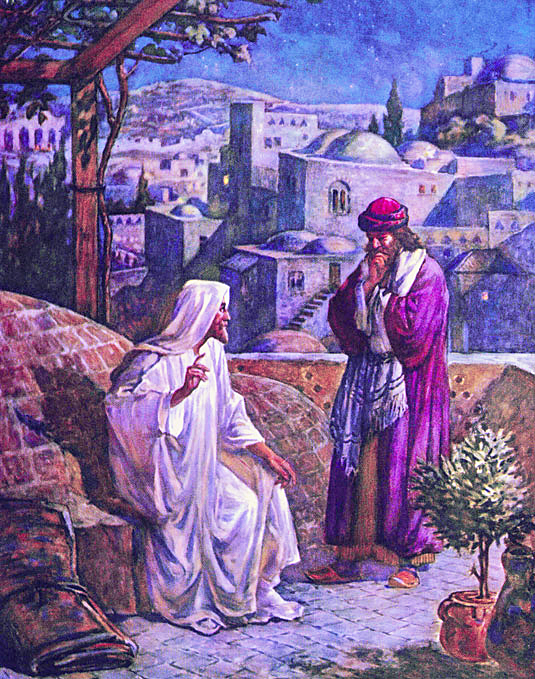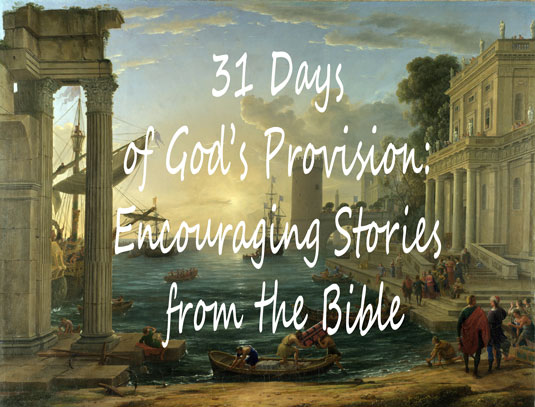 The story of Nicodemus takes place during an early time of Jesus’ ministry. He had turned water into wine, performed other signs, preached about the kingdom of God, and had just driven money changers out of the temple. This caused no end of consternation for the religious leaders. They are concerned that people are starting to take notice of this Jesus and so they begin to question his authority. He responds with a cryptic statement about his forthcoming death and resurrection, which they completely miss.
The story of Nicodemus takes place during an early time of Jesus’ ministry. He had turned water into wine, performed other signs, preached about the kingdom of God, and had just driven money changers out of the temple. This caused no end of consternation for the religious leaders. They are concerned that people are starting to take notice of this Jesus and so they begin to question his authority. He responds with a cryptic statement about his forthcoming death and resurrection, which they completely miss.
The Jews then responded to him, “What sign can you show us to prove your authority to do all this?” Jesus answered them, “Destroy this temple, and I will raise it again in three days.” They replied, “It has taken forty-six years to build this temple, and you are going to raise it in three days?” But the temple he had spoken of was his body. John 2:18-21, NIV
As learned men of Scripture, they should have been able to put two and two together and recognize the promised Messiah when he arrived. But their hearts were hard and their positions of prestige were things they didn’t want to let go of. One of the Pharisees however, was astute enough to recognize that Jesus had come from God.
Now there was a Pharisee, a man named Nicodemus who was a member of the Jewish ruling council. He came to Jesus at night and said, “Rabbi, we know that you are a teacher who has come from God. For no one could perform the signs you are doing if God were not with him.” John 3:1-2, NIV
As a Pharisee, Nicodemus is a man who has dedicated his life to keeping the law. He is also a member of the Sanhedrin, and so he is, as Jesus describes, a teacher of the Jews. Nicodemus is wealthy, dignified and a man of importance in Jerusalem. When our story opens, Nicodemus has paid Jesus a night-time visit, to speak with him at length and in a manner that could not be accomplished during the daytime or would have garnered disapproval from his colleagues.
While Nicodemus is a righteous man, he realizes that Jesus is teaching about something more than just religion. He goes to Jesus to find out what it is. Jesus knows the question in his heart, so he cuts to the chase. Nicodemus wants to know how he can enter the kingdom of God that Jesus has been preaching about.
Jesus replied, “Very truly I tell you, no one can see the kingdom of God unless they are born again.” John 3:3, NIV
Nicodemus is immediately confused. This criteria is biologically impossible, so he asks Jesus to clarify.
“How can someone be born when they are old?” Nicodemus asked. “Surely they cannot enter a second time into their mother’s womb to be born!”
Jesus answered, “Very truly I tell you, no one can enter the kingdom of God unless they are born of water and the Spirit. Flesh gives birth to flesh, but the Spirit gives birth to spirit. You should not be surprised at my saying, ‘You must be born again.’ The wind blows wherever it pleases. You hear its sound, but you cannot tell where it comes from or where it is going. So it is with everyone born of the Spirit.” John 3:4-8, NIV
Jesus explains that just as each person has experienced a physical birth, they must also experience a spiritual birth. In the original Greek the word for “again” means “from above, from a higher place, or from things that come from God.”
Jesus is talking about two births—one natural, one spiritual. Nicodemus was not a child of God by natural birth, but could become a child of God by spiritual birth.
Yet to all who did receive him, to those who believed in his name, he gave the right to become children of God— children born not of natural descent, nor of human decision or a husband’s will, but born of God. John 1:12-13, NIV
Nicodemus is still having trouble understanding, so Jesus plainly tells him who he is and what he’s here to do.
“How can this be?” Nicodemus asked. “You are Israel’s teacher,” said Jesus, “and do you not understand these things? Very truly I tell you, we speak of what we know, and we testify to what we have seen, but still you people do not accept our testimony. I have spoken to you of earthly things and you do not believe; how then will you believe if I speak of heavenly things? No one has ever gone into heaven except the one who came from heaven—the Son of Man. Just as Moses lifted up the snake in the wilderness, so the Son of Man must be lifted up, that everyone who believes may have eternal life in him.”
For God so loved the world that he gave his one and only Son, that whoever believes in him shall not perish but have eternal life. For God did not send his Son into the world to condemn the world, but to save the world through him. Whoever believes in him is not condemned, but whoever does not believe stands condemned already because they have not believed in the name of God’s one and only Son. John 3:9-18, NIV
Nicodemus is given the gospel message by Christ himself. He had only to place his faith in Jesus as the promised Messiah, and he would be born again. Initially confused, Nicodemus now understands.
And this is the testimony: God has given us eternal life, and this life is in his Son. Whoever has the Son has life; whoever does not have the Son of God does not have life. 1 john 5:11-12
Nicodemus’ story was one of confusion, but God’s provision was one of clarity.
Join me tomorrow for a story involving a well-stocked pantry, a critical situation, and a provision of sensibility!
 If you’ve missed any part of this series, you can find all of the posts in the side bar category 31 Days of God’s Provision.
If you’ve missed any part of this series, you can find all of the posts in the side bar category 31 Days of God’s Provision.
On the journey toward Home,












{ 1 trackback }